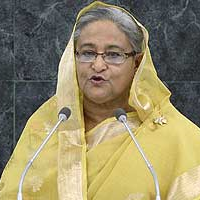Reuters: India Uncovers Plot to Assassinate Bangladeshi PM
 Prime Minister of Bangladesh Sheikh Hasina (photo: AFP)
Prime Minister of Bangladesh Sheikh Hasina (photo: AFP)
The National Investigation Agency (NIA) has uncovered an alleged plot by a banned Bangladeshi militant group to assassinate Prime Minister Sheikh Hasina and carry out a coup, three senior Indian security officials reportedly told Reuters on Tuesday.
India will hand over details of the plot to its eastern neighbour Bangladesh, along with information on members of Jamaat-ul-Mujahideen that has already carried out scores of attacks in Bangladesh.
The alleged conspiracy was discovered after two members of the group were killed in an explosion while building homemade bombs at a house in West Bengal earlier this month. Indian police claim the militants were Bangladeshis and were using India as a safe haven to plan the attacks.
"The strategy was to hit the political leaders of the country and demolish the democratic infrastructure of Bangladesh," an unnamed Home Ministry official told Reuters.
"This was all being planned on Indian soil and we could have been blamed if there was an attack,” he added.
Bangladesh did not comment directly on the alleged threat to its prime minister, but said it had tightened security on the border with India.
"We have received this information unofficially from India about a terror threat to top politicians in Dhaka. This is the first time there has been such information," Bangladesh's junior home minister, Asaduzzaman Khan, told Reuters.
"We are always serious about curbing the activities of the militants. After the news from India our (security) efforts have been raised manifold," he said.
The country has suffered three major army coups and several smaller rebellions since gaining independence from Pakistan in 1971.
According to Reuters, the Jamaat-ul-Mujahideen also allegedly planned to assassinate the country's main opposition leader, Khaleda Zia. The two rival female leaders have dominated the country's politics for over a decade.
However, the security officials did not specify how the militants planned to carry out the assassinations.
In 2005 the Jamaat-ul-Mujihadeen detonated nearly 500 bombs almost simultaneously across Bangladesh, including in Dhaka. Its militants later carried out suicide attacks on several courthouses, killing 25 people and injuring hundreds. Earlier this year, gunmen opened fire and tossed bombs at a security van carrying members of the group on their way to court.
For India, these latest revelations are embarrassing as they show just how effortlessly Bangladeshi militants are using the Indian state of West Bengal as a safe haven. The government has now stepped up pressure on the state administration led by Chief Minister Mamata Banerjee who has been accused of pandering to the Muslim community for votes while turning a blind eye to militants operating from Indian soil.
India has arrested at least six people tied to the coup plot, according to the NIA. The suspects were radicalised in "violent jihadi ideology" at a local madrasa, about 35 km from the blast site, according to the agency.
Police found nearly five dozen crude bombs and arrested two women who were living in the same house and were trying to burn bomb-making manuals after the incident. In a nearby home, police found 35 unexploded bombs.
“The quantity of explosives secured is probably only a minuscule amount of what has been built,” said S. Chandrasekharan, director of the South Asia Analysis Group in New Delhi. “The border with Bangladesh is literally open at the moment.”
To Learn More:
Exclusive: India uncovers suspected plot to assassinate Bangladeshi PM - security officials (by Rupam Jain Nair and Andrew Macaskill, Reuters)
NIA Says Burdwan Bombs Were Aimed at Bangladesh (by Karan Singh, AllGov India)
Bangladesh war crimes panel sentences Islamist leader to death, prompts protests (by Serajul Quadir, Reuters)
- Top Stories
- Controversies
- Where is the Money Going?
- India and the World
- Appointments and Resignations
- Unusual News
- Latest News
- India College Chain’s Expansion into U.S. Draws Opposition from Massachusetts Officials over Quality of Education
- Milk Shortages in India Tied to Release of New Movies Featuring Nation’s Favorite Stars
- Confusion Swirls around Kashmir Newspaper Ban in Wake of Violent Street Protests
- Polio-Free for 5 Years, India Launches Vaccine Drive after Polio Strain Discovery
- New Aviation Policy Could Increase Service, Lower Ticket Prices






Comments